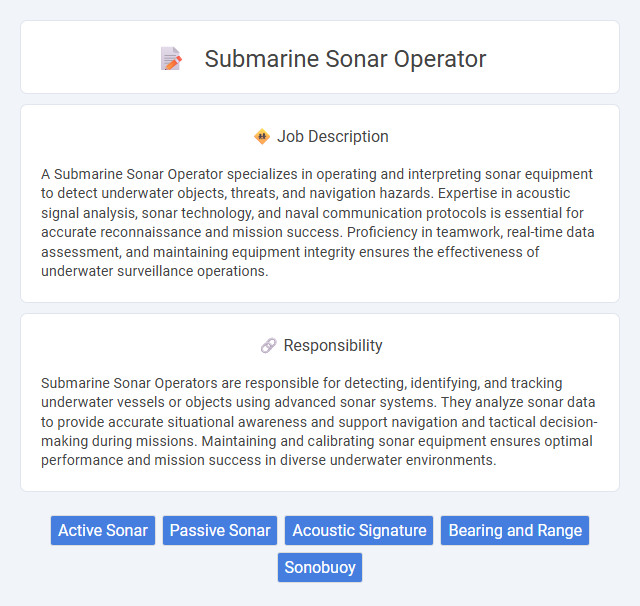
A Submarine Sonar Operator specializes in operating and interpreting sonar equipment to detect underwater objects, threats, and navigation hazards. Expertise in acoustic signal analysis, sonar technology, and naval communication protocols is essential for accurate reconnaissance and mission success. Proficiency in teamwork, real-time data assessment, and maintaining equipment integrity ensures the effectiveness of underwater surveillance operations.
Individuals with strong concentration, quick decision-making skills, and the ability to work under high-pressure conditions likely find submarine sonar operator roles suitable. Those prone to anxiety or difficulty in confined spaces may struggle with the job's demanding environment and isolation. Overall, candidates with resilience, technical aptitude, and adaptability probably match well with the submarine sonar operator position.
Qualification
Submarine Sonar Operators require specialized training in underwater acoustic detection and interpreting sonar data to ensure vessel safety and mission success. Proficiency in electronic equipment, strong analytical skills, and the ability to operate under high-pressure conditions are essential qualifications. Candidates typically need a background in naval operations, technical certifications in sonar systems, and experience in maritime communications.
Responsibility
Submarine Sonar Operators are responsible for detecting, identifying, and tracking underwater vessels or objects using advanced sonar systems. They analyze sonar data to provide accurate situational awareness and support navigation and tactical decision-making during missions. Maintaining and calibrating sonar equipment ensures optimal performance and mission success in diverse underwater environments.
Benefit
Submarine sonar operators likely benefit from highly specialized training that enhances their technical skills in underwater navigation and threat detection. Their role probably offers opportunities for career advancement within naval operations due to the critical nature of sonar technology in maritime security. The job may also provide unique benefits such as travel, teamwork in high-stakes environments, and competitive military compensation packages.
Challenge
The role of a Submarine Sonar Operator likely involves interpreting complex acoustic data under high-pressure conditions, demanding sharp analytical skills and quick decision-making. Challenges may arise from the need to accurately detect and classify underwater objects amidst ambient noise and unpredictable marine environments. This position probably requires continuous learning to adapt to evolving sonar technologies and tactical scenarios.
Career Advancement
Submarine Sonar Operators develop critical skills in underwater acoustics and signal processing, positioning themselves for advanced roles such as Sonar Supervisor or Tactical Supervisor. Mastery of sonar systems and combat information operations enhances eligibility for technical specialist or training instructor positions. Career advancement often involves specialized certifications and leadership experience within naval operations, contributing to higher responsibilities and increased rank.
Key Terms
Active Sonar
Submarine Sonar Operators specializing in Active Sonar utilize high-frequency sound waves to detect and track underwater objects by emitting pulses and analyzing the returning echoes. They operate sophisticated sonar equipment to precisely locate enemy submarines, mines, and underwater obstacles, ensuring mission safety and navigational accuracy. Expertise in interpreting acoustic signals and adjusting sonar settings in real-time is critical for effective detection and threat assessment in complex underwater environments.
Passive Sonar
A Submarine Sonar Operator specializing in Passive Sonar plays a crucial role in underwater detection by analyzing sound signals without emitting active pings, ensuring stealth and tactical advantage. They interpret acoustic data from hydrophones to identify and classify contacts such as enemy vessels, underwater hazards, and marine life. Expertise in sonar signal processing and noise reduction techniques enhances mission success and submarine safety during covert operations.
Acoustic Signature
Submarine Sonar Operators specialize in detecting and analyzing acoustic signatures to identify underwater vessels and obstacles. They utilize advanced sonar systems to interpret sound waves, enabling precise navigation and threat assessment in complex underwater environments. Mastery of acoustic signature patterns is critical for maintaining stealth and operational safety during submarine missions.
Bearing and Range
Submarine Sonar Operators specialize in detecting and interpreting underwater signals to determine the bearing and range of contacts, critical for navigation and threat assessment. Precise calculation of bearing and range enables accurate tracking of vessels, improving mission safety and operational effectiveness. Mastery of sonar equipment and acoustic signal analysis is essential for maintaining situational awareness and submarine stealth.
Sonobuoy
Submarine Sonar Operators specialize in deploying and monitoring sonobuoys to detect underwater threats and maintain situational awareness. Sonobuoys transmit acoustic signals that help identify enemy submarines, surface vessels, and underwater mines, crucial for mission success and crew safety. Mastery in interpreting sonobuoy data ensures accurate sonar readings and effective tactical decisions in complex maritime environments.
 kuljobs.com
kuljobs.com